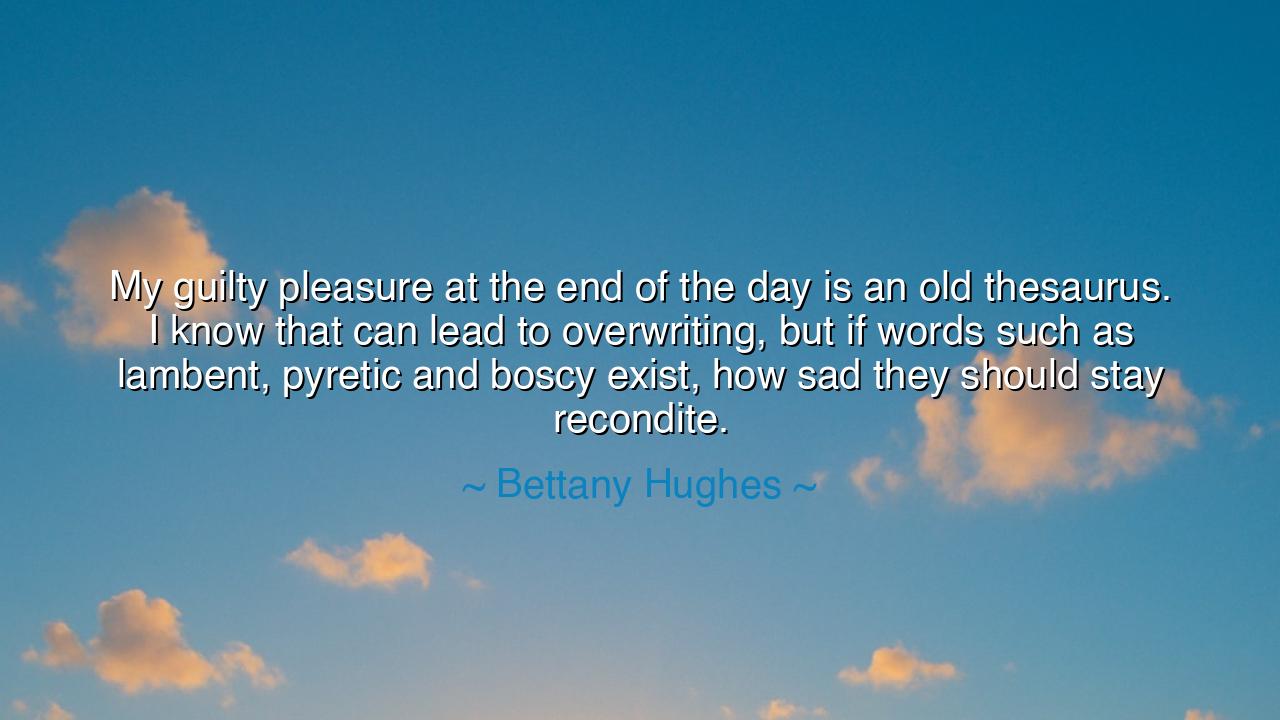
My guilty pleasure at the end of the day is an old thesaurus. I
My guilty pleasure at the end of the day is an old thesaurus. I know that can lead to overwriting, but if words such as lambent, pyretic and boscy exist, how sad they should stay recondite.






Hear the words of Bettany Hughes, a lover of wisdom and custodian of history: “My guilty pleasure at the end of the day is an old thesaurus. I know that can lead to overwriting, but if words such as lambent, pyretic and boscy exist, how sad they should stay recondite.” In this confession, there is more than an affection for words. There is a lament for forgotten treasures, a reminder that language is not merely a tool, but a living vessel of beauty, memory, and imagination.
The meaning of her words begins with the thesaurus—that ancient trove of expression, where words gather like jewels in a chest. To her, this book is not only a reference but a delight, a reminder that the world of thought is as vast as the stars. She names rare words—lambent, glowing softly like light upon water; pyretic, burning with fever; boscy, shaded with bushes. These are not dead sounds, but living spirits. To leave them hidden is to bury treasure, to silence music that could yet be sung.
The ancients, too, revered the power of words. The Greeks saw Logos as divine—the word as order, truth, creation itself. In India, the Vedas were passed from tongue to ear for centuries, for to speak a word was to invoke sacred power. Every culture that has endured knew that to lose words is to lose part of the soul. Hughes laments not the complexity of language, but the sadness of neglect, for when words vanish from use, so too do the thoughts they carry.
History gives us an example in Shakespeare, who did not shy from rare or invented words. He gave the English tongue over 1,700 new terms, weaving them into plays that still breathe today. Words like "bedazzled," "lonely," and "assassination" were once strange, but he brought them to life. Had he feared the charge of “overwriting,” the English language would be poorer. Hughes follows in this spirit, insisting that words too beautiful to remain recondite deserve to walk among us.
Her words also carry a hidden truth about human longing. For to use rich words is not vanity, but desire—to name the world more precisely, to capture its subtle shades. To say merely “shining” is one thing; to say lambent is another, for it carries a softer light, a gentler glow. Each word is a vessel of nuance, and to wield them is to enrich both thought and feeling. Thus the thesaurus is not a crutch, but a lantern guiding us to deeper clarity.
The lesson, O seeker, is this: do not fear the wealth of language. Words are gifts handed down by countless generations, shaped by poets, scholars, and common folk. To leave them unused is to abandon inheritance. Speak them, write them, savor them, not to flaunt knowledge, but to give life to the fullness of experience. For language is not ornament—it is the bridge between hearts, the map of the mind, the chorus of the human spirit.
Practical is this counsel: read widely, and when you find a word unknown, do not pass it by. Learn it, taste it, use it in thought or speech, even if only in whispers to yourself. Teach children the joy of rare words, that their minds may expand beyond the narrow confines of convenience. And when you write, do not fear richness—only be sure that beauty serves truth, not vanity. For then your words will shine like lambent flame, burn with pyretic passion, and grow like a boscy grove, alive with meaning.
Thus Bettany Hughes’ words resound as both confession and charge: “If such words exist, how sad they should stay recondite.” Let us not bury the treasures of language, but lift them, speak them, and pass them on, that future generations may inherit not silence but song. For to love words is to love life itself, and to wield them well is to shape the destiny of thought and memory across the ages.






AAdministratorAdministrator
Welcome, honored guests. Please leave a comment, we will respond soon